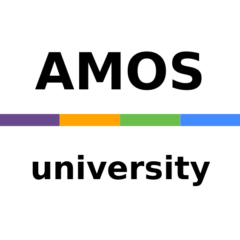We are looking for sponsors for our Scrum student projects for the coming winter semester. Nine computer science students will develop open-source software based on your (industry) requirements. #scrum #opensource
This is great for student #collegerecruiting, benefiting from student innovation, and getting work done. Good projects are sales prototypes, technology demonstrators, technology evaluators, or simply useful components and apps.
If you are interested, please get in touch with Prof. Riehle.
1. PROJECT TIMELINE
We are acquiring projects for the AMOS Project course.
In early October, students will apply to projects, and we will assign them to teams in the second week of October. A student team consists of six software developers, two product owners, and one Scrum Master; each team is supported by one teaching assistant.
The project officially kicks off (first day of class) on 2023-10-18. Each student has to put in at least 300 hours of work over the course of three months. The team in total then performs more than 2000 hours of work.
The project class schedule can be found on the schedule tab at https://amos.uni1.de. (If you are looking at the previous semester’s spreadsheet, please click on “next instance” on the front (index) page of the spreadsheet to get to the next (upcoming) semester.
The project ends on 2024-02-07 with the AMOS demo day.
—
2. INDUSTRY ENGAGEMENT
We will introduce you (industry partner) to your team in the second or third week of October (the week before class starts). We ask the student product owners to get in touch with you to set up a meeting schedule that works for both sides. In general, students are eager to hear from you about requirements.
It would be good if you are available for a 1h meeting each week in the first few weeks of the project when students fill the product backlog; you can be less active afterwards. You can also ask to be more engaged. On the student side, the product owners and Scrum master are to manage this process though we suggested that all students participate in meetings with industry partners.
All business is conducted online. You can ask for in-person meetings, but you can’t require it. Inviting students to meet in person over a pizza at your office is a reasonable start, if you would like to engage with them this way. Not all students may be willing to come.
Some more dos and don’ts at https://goo.gl/HV14Xh
—
3. THE AMOS PROJECT
The student teams will consist of six software developers, two product owners, and one Scrum master. Almost all students will be Master’s degree students. Software developers are typically computer science students, product owners are typically information systems (Wirtschaftsinformatik) students.
This course teaches process, not programming. The software developing students are expected to be good programmers already. Students learn Scrum and related XP practices. The schedule at https://amos.uni1.de provides access to slides and videos.
For winter 2023/24 we are updating lecture content, so please stay tuned. The old slides are on GitHub https://github.com/dirkriehle/amos-course and the old videos are on Youtube https://youtube.com/playlist?list=PLQ2ODVSeOYlV4yfIzYk_SkS2kQKxiHQAa
—
4. PROJECT RESULTS
All project results will be available in the project’s GitHub repository at https://github.com/amosproj
An impression of the work results is available by way of Youtube videos at https://oss.cs.fau.de/tag/amos-project-reports/
You can manage through your requirements what you want the team to focus on: Features, documentation, user experience, etc. Please note that you can only provide requirements and priorities, not total amount of work. The available time is defined by the ECTS (study credit points) associated with the course (10 ECTS / 300h per student).
—
5. STUDENT RECRUITING
As you get to know your team, you can determine who might be a good student helper at work. Feel free to make them an offer for a student job.
Student jobs, taken up by competent students who enjoyed your topic and the project, are the best way of taking the open source software and putting it to use at your company. The permissive open source license the projects use (typically MIT) allow you to take the project private, if you so desire.

